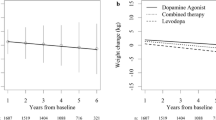Abstract
Weight loss is frequent in patients with Parkinson’s disease (PD). Reduced energy intake and/or increased energy expenditure have been postulated as the cause. Dysphagia, anorexia, and gastrointestinal dysfunction may be possible causes of reduced energy intake; whereas, rigidity, tremor, and levodopa-induced dyskinesia may increase energy expenditure. Levodopa may enhance glucose metabolism resulting in enhanced energy expenditure. Depression, anti-parkinsonian drugs, and medical complications such as pneumonia and malignancies also may facilitate weight loss in PD. Combinations of various degrees of these factors, especially in advanced PD, may produce weight loss. Such weight loss is associated with malnutrition which may precipitate infection and decubitis; accelerate motor, behavioral, and autonomic impairment; consequently spoiling one’s quality of life. Attention must be paid as well to motor symptoms to prevent or reverse weight loss in PD patients.
Similar content being viewed by others
References
Abbott RA, Cox M, Markus H, Tomkins A (1992) Diet, body size and micronutrient status in Parkinson’s disease. Eur J Clin Nutr 46:879–884
Beyer PL, Palarino MY, Michalek D, Busenbark K, Koller WC (1995) Weight change and body composition in patients with Parkinson’s disease. J Am Diet Assoc 95:979–983
Broussolle E, Borson F, Gonzalez de Suso JM, Chayvialle JA, Beylot M, Chazot C (1991) Augmentation de la depense energetique au cours de la maladie de Parkinson. Rev Neurol 147:46–51
Campbell AJ, Spears GF, Brown JS, Busby WJ, Borrie MJ (1990) Anthropometric measurements as predictors of mortality in a community population aged 70 years and over. Age Ageing 19:131–135
Chen H, Zhang SM, Hernan MA, Willett WC, Ascherio A (2003) Weight loss in Parkinson’s disease. Ann Neurol 53:676–679
Davies KN, King D, Davies H (1994) A study of the nutritional status of elderly patients with Parkinson’s disease. Age Ageing 23:142–145
Durrieu G, Llau ME, Rascol O, Senard JM, Rascol A, Montastruc JL (1992) Parkinson’s disease and weight loss: a study with anthropometric and nutritional assessment. Clin Auton Res 2:153–157
Edwards LL, Pfeiffer RF, Quigley EMM, Hofman R, Balluff M (1991) Gastrointestinal symptoms in Parkinson’s disease. Mov Disord 6:151–156
Evidente VGH, Caviness JN, Adler CH, Gwinn-Hardy KA, Pratley RE (2001) Serum leptin concentrations and satiety in Parkinson’s disease patients with and without weight loss. Mov Disord 16:924–927
Gasparini M, Spinnler H (1975) Fatting of parkinsonians: a hypothalamic side effect of L-dopa? Med J Aust 2:617
Jankovic J, Wooten M, Van der Linden C, Hansson B (1992) Low body weight in Parkinson’s disease. Southern Med J 85:351–354
Kytömäki O, Nousiainen R, Pekkarinen A, Rinne UK, Viljanen M (1973) Plasma growth hormone and insulin response to levodopa and amantadine. J Neural Transm 34:145–151
Levi S, Cox M, Lugon M, Hodkinson M, Tomkins A (1990) Increased energy expenditure in Parkinson’s disease. Br Med J 301:1256–1257
Markus HS, Cox M, Tomkins AM (1992) Raised resting energy expenditure in Parkinson’s disease and its relationship to muscle rigidity. Clin Sci 83:199–204
Markus HS, Tomkins AM, Stern GM (1993) Increased prevalence of under nutrition in Parkinson’s disease and its relationship to clinical disease parameters. J Neural Transm (P-D Sect) 5:117–125
Moroo I, Yamada T, Hirayama K (1994) Body weight loss in patients with Parkinson’s disease. Neurological Med 41:65–67 (in Japanese)
Nirenberg MJ, Water C (2006) Compulsive eating and weight gain related to dopamine agonist use. Mov Disord 21?:524–529
Nozaki S, Saito T, Matsumura T, Miyai I, Kang J (1999) Relationship between weight loss and dysphasia in patients with Parkinson’s disease. Clinical Neurol 39:1010–1014 (in Japanese)
Ondo WG, Ben-Aire L, Jankovic J, Lai E, Contant C, Grossman R (2000) Weight gain following unilateral pallidotomy in Parkinson’s disease. Acta Neurol Scand 101:79–84
Parkinson J (1817) An essay on the shaking palsy. Whillingham and Bowland, London
Pfeiffer RF (2003) Gastrointestinal dysfunction in Parkinson’s disease. Lancet Neurology 2:107–116
Rosati G, Maioli M, Aiello I, Farris A, Agnetti V (1976) Effects of long-term L-dopa therapy on carbohydrate metabolism in patients with Parkinson’s disease. Eur Neurol 14:229–239
Sandyk R (1993) The relationship between diabetes mellitus and Parkinson’s disease. Int J Neurosci 69:125–130
Sirtori CR, Bolme P, Azarnoff DL (1972) Metabolic response to acute and chronic L-dopa administration in patients with parkinsonism. New Engl J Med 287:729–733
Stevenson JAF, Montemurro DF (1963) Loss of weight and metabolic rate of rats with lesions in the medial and lateral hypothalamus. Nature 198:92
Toth MJ, Fishman PS, Poehlman ET (1997) Free-living daily energy expenditure in patients with Parkinson’s disease. Neurology 48:88–91
Tuite PJ, Maxwell RE, Ikramuddin S, Kotz CM, Billington CJ, Thielen SD (2005) Weight and body mass index in Parkinson’’s disease patients after deep brain stimulation surgery. Parkinsonism Relat Disord 11:247–252
Uc EY, Struck LK, Rodnitzky RL, Zimmerman B, Dobson J, Evans WJ (2006) Predictors of weight loss in Parkinson’s disease. Mov Disord 21:930–936
Vardi J, Oberman Z, Rabey I, Streifler M, Ayalon D, Herzberg M (1976) Weight loss in patients treated long-term with levodopa. J Neurol Sci 30:33–40
Wodak J, Gilligan BS, Veale JL, Dowty BJ (1972) Review of 12 months’ treatment with L-dopa in Parkinson’s disease, with remarks on unusual side effects. Med J Aust 2:1277–1282
Wszolek ZK, Markopoulou K (1998) Olfactory dysfunction in Parkinson’s disease. Clin Neurosci 5:94–101
Yapa RSS, Playfer JR, Lye M (1989) Anthropometric and nutritional assessment of elderly patients with Parkinson’s disease. J Clin Exp Gerontol 11:155–164
Author information
Authors and Affiliations
Corresponding author
Rights and permissions
About this article
Cite this article
Kashihara, K. Weight loss in Parkinson’s disease. J Neurol 253 (Suppl 7), vii38–vii41 (2006). https://doi.org/10.1007/s00415-006-7009-0
Issue Date:
DOI: https://doi.org/10.1007/s00415-006-7009-0




